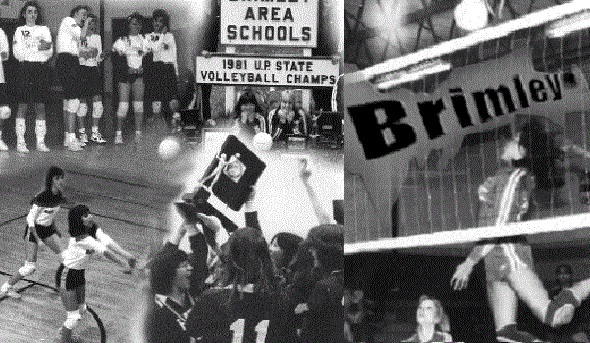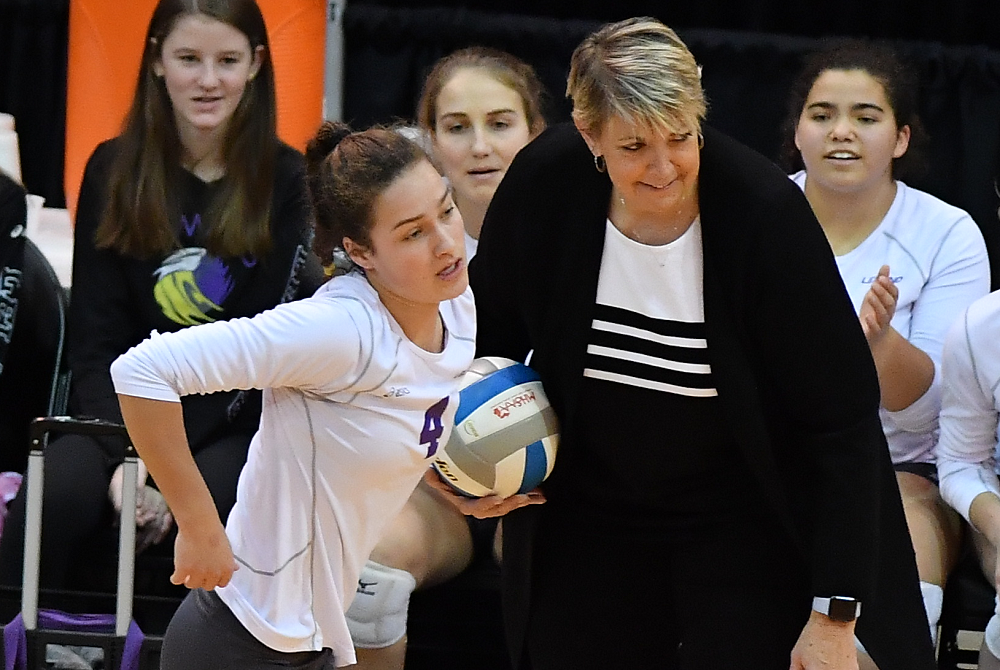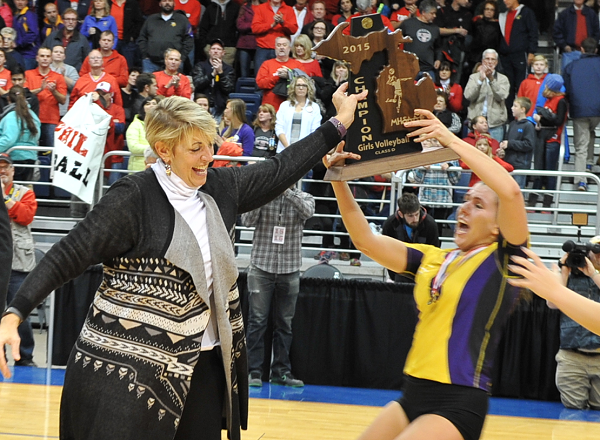
#TBT: Brimley Makes Name as UP Power
October 26, 2017
By Geoff Kimmerly
Second Half editor
Girls Volleyball Districts begin Monday, providing another generation the opportunity to become "Legends of the Games."
The MHSAA during the late 1990s and early 2000s honored past champions at the Finals as exactly that – and for today's #TBT we'll recall our 2000 volleyball honoree, Brimley, which was recognized the season the MHSAA's Finals became unified after formerly having separate tournaments for each peninsula.
Below is the piece that ran in the souvenir program celebrating the Bays' dynasty.
It was a legitimate question – "Where's Brimley?"
It had been a long time since the little town located off Whitefish Bay in the Upper Peninsula had made some noise on the statewide level with its school's sports success – not since back-to-back Class D MHSAA Boys Basketball crowns in 1950 and 1951.
It was 1978, and the growth of girls sports saw the birth of a volleyball team at Brimley. Charles Compo took on the coaching reins with very little experience in the sport, but with an eagerness to learn and to teach.
It was the start of something big.
Just two years later, the first MHSAA Upper Peninsula Girls Volleyball Tournament took place, won, somewhat predictably, by a bigger school. Class C St. Ignace took the measure of Bessemer in that first tournament, but what happened next gave a whole new meaning to the phrase "U.P. Power."
Over the next decade, Brimley established itself as the first volleyball dynasty in the Upper Peninsula, and in fact, raised its game to where it was occasionally the top-ranked team statewide in Class D in the coaches polls.
With open-class U.P. championships in 1981, 1982, 1983, 1984, 1985, 1987, 1988, and the first U.P. Class D title in 1991, Brimley earned its spot as one of the Legends of the Games.
But to earn that spot in U.P. and volleyball lore, the Bays had to travel – and oh, did they travel.
"We did a lot of traveling," Compo said. "That's where the competition was. It helped our program get statewide recognition."
Located just off I-75, the Bays went southbound weekend after weekend to face Lower Peninsula competition, which had been playing the game longer. It didn't take long for Brimley to become established as a force to be reckoned with.
"Being from the U.P., we traveled many, many hours on a bus. On those long trips, our teams became very close and developed lasting bonds," said Laura Compo, a setter on the team from 1985 to 1988. "When we arrived at some tournaments, many people wondered where Brimley was; they had never heard of us. Some would even laugh out loud about playing a Class D team from the U.P. More often than not, they wouldn't forget us at the end of a match and tournament. It was very rewarding to make our mark on Michigan volleyball."
While the road to success included long trips, it was an opponent of a relatively short drive away that was Brimley's largest hurdle in its rise to the top. Knocking off the first tournament champion, St. Ignace, was not an easy task.
"The St. Ignace team had beaten us every other time we had met over the previous three seasons and had our number," said Laura Newland, a setter on Compo's first three teams. "They looked like giants, they acted cocky and had a confidence about them that made our team feel like we didn't belong in the same gymnasium with them."
The breakthrough match was in the regional tournament that year, where the Bays finally defeated the Saints in three games to advance to the final level of the tournament.
"That game, the excitement of the fans, the near perfect game both sides played will always be the championship for me – it was one of the greatest experiences of my life," Newland said.
"The first time we defeated St. Ignace, everyone in the stands were on their feet. Some of the dads were crying," said Robin Burton, a setter on the team from 1980 to 1982. "It was the turning point for the team.”
Brimley took the U.P. title a week later by defeating Watersmeet. A team made up of three seniors, four sophomores and four juniors was poised for more success. "We should be better next year, we really should," said Compo after the first title.
Four more titles ensued, with back-to-back wins over Ironwood in 1982 and 1983 and Bessemer in 1984 and 1985. Sault Ste. Marie broke the first streak in 1986 by representing the Eastern U.P. in the finals and claiming the championship, but Brimley's last two Open Class titles came in 1987 and 1988. Two years later, Compo retired from coaching after compiling a 12-year record of 408-74. The next year, the U.P. tournament was broken into classes, and Brimley, directed by Coach Walter Hyvarinen, won the first Class D title.
The Brimley players remember Coach Compo.
"My fondest memory of the team is of Coach Compo," said Burton. "He was a motivator and made working hard fun. He gave much of his time to volleyball – not just practices and games – but in-between – finding new ways to improve our skills and getting us into tournaments all over the state. We wouldn't have been nearly as successful without his extra efforts."
"I remember all the hard work we put into practices and games. We had so much fun, we felt like one big family," said Sherri Carrick, an outside hitter from 1984-87. "Mr. Compo was such a great coach and person that only he could push me to be the player that I was."
Legends in high school sports are about teams that build up their communities, and for the decade of the 1980's, it happened in Brimley. It provided lifetime memories for a team that still makes those who took part feel every bit as proud today as they did while in the school's uniform.
"I remember that pride the most," said Barb Cameron, a middle hitter on the 1985-88 teams. "That, and the shared desire to win against all odds. People would say, 'Where's Brimley?' And we showed them!"

2023 WISL Award Honoree Glass Continuing to Create Leaders On Court & Off
By
Geoff Kimmerly
MHSAA.com senior editor
March 2, 2023
Hailing from one of Michigan’s smallest communities, Laurie Glass has made an impact that continues to connect all over Michigan.
But her impact on women’s athletics began long before a career that has seen the longtime Leland volleyball coach become one of the winningest in her sport in state history.
As a high school junior in 1976, she recruited seven classmates and a coach to form Leland’s first girls sports team – for basketball – and the same group then played volleyball that winter. She was a senior and major contributor when, during their second season, the Comets won the 1978 Class D volleyball championship.
More than four decades later, Glass is a Michigan legend in that sport – a winner of 1,218 matches with Leland and Traverse City Central and three Finals championships with the Comets. She’s also a nationally-recognized voice in volleyball and women’s athletics as a whole – and this year’s MHSAA Women in Sports Leadership honoree for those many and continuing contributions.
“Because I’m a teacher and coach, that’s my desire to help the youth be the best they could be. And if I can impact a coach or impact another district or program, that means I’m affecting more youth in a positive way,” Glass said. “So for me, it’s just the ripple effect; it gets a lot bigger when I’m starting little drops in other places. So I can affect the hundreds of kids that I’ve seen go through Leland, or I can impact the larger audience by impacting coaches or impacting kids in other places that can then impact other people. It allows me a wider audience for wanting to help young women to be their best young woman self in however way I can make that happen.”
Each year, the Representative Council considers the achievements of women coaches, officials and athletic administrators affiliated with the MHSAA who show exemplary leadership capabilities and positive contributions to athletics.
Leland finished 49-13 this past season and reached the Division 4 Quarterfinals. Glass has a record of 1,218-393-122 over more than three decades as a varsity volleyball coach, having led the Comets for a combined 29 seasons over three tenures, the first beginning with the 1989-90 winter season and later picking up with her most recent return for Fall 2010. She also coached Traverse City Central for four seasons beginning in 1991-92.
 Glass led Leland to Class D Finals championships in 2002, 2006 and 2015, and runner-up finishes in Class D in 2014 and Division 4 in 2018 and 2019. She was named to the Michigan Interscholastic Volleyball Coaches Association (MIVCA) Hall of Fame in 2006, and selected as national Coach of the Year in volleyball in 2014 by the National Federation of State High School Associations (NFHS) Coaches Association. She’s a three-time MIVCA Coach of the Year and was named Michigan High School Coaches Association (MHSCA) Coach of the Year for volleyball in 2015. She also was a finalist for National High School Athletic Coaches Association (NHSACA) national Coach of the Year in 2014.
Glass led Leland to Class D Finals championships in 2002, 2006 and 2015, and runner-up finishes in Class D in 2014 and Division 4 in 2018 and 2019. She was named to the Michigan Interscholastic Volleyball Coaches Association (MIVCA) Hall of Fame in 2006, and selected as national Coach of the Year in volleyball in 2014 by the National Federation of State High School Associations (NFHS) Coaches Association. She’s a three-time MIVCA Coach of the Year and was named Michigan High School Coaches Association (MHSCA) Coach of the Year for volleyball in 2015. She also was a finalist for National High School Athletic Coaches Association (NHSACA) national Coach of the Year in 2014.
Glass has spoken multiple times at the MHSAA Women In Sports Leadership Conference and several times at the MIVCA Coaches Clinic, and among various other engagements was the featured speaker at the Nebraska Athletic Association Coaches Clinic. She will receive the Women In Sports Leadership Award during the MHSAA Division 1 Girls Basketball Final on March 18 at Michigan State University’s Breslin Center.
“Laurie Glass is recognized most on the statewide level for leading one of the most successful volleyball programs in state history. But she is known among her peers most for the way she teaches not only volleyball but life skills to her athletes,” MHSAA Executive Director Mark Uyl said. “Her leadership creates more leaders, be they the athletes who have the opportunity to play for her or the coaches who learn from her and receive her mentorship.”
Glass’ roots are in one of the most accomplished athletic families in Michigan high school history.
Her father Larry Glass coached Northwestern University’s men’s basketball program from 1963-69, and later took over the Leland girls basketball program and led the Comets to a 388-110 record and three straight Class D Finals championships (1980-82) over two tenures from 1977-91 and 2000-05. Laurie’s sister Rebecca McKee played basketball at Leland and Michigan State University, and her brother Michael Glass played basketball at Lansing Community College before also becoming a high school and college coach.
Laurie also coached and parented arguably the most accomplished volleyball player – and perhaps top female athlete across all sports – in Michigan high school history. Her daughter Alisha Glass-Childress graduated from Leland in 2006 with national records for career kills, aces and blocks, and the first two still top those respective lists. Alisha, also an all-state basketball player, went on to star on the volleyball court at Penn State and as the U.S. Olympic team setter in 2016 in helping that team to the bronze medal.
Larry Glass’ lessons still ring true as Laurie passes them on to another generation. One of her favorite sayings from her father was “you can’t take money out of the bank until you put money in” – in essence, a coach can’t expect athletes to accept criticism or a hard ask if that coach first hasn’t invested in them. Another of her dad’s themes involved making sure players learned fundamentals at young ages and improved on them at all levels, whether they won games or not during those early years. As one of his middle school coaches, that stuck with her, and it remains a basic component of her coaching.
“I’ve always said that we compete with teams that are way more athletic, have all the things on paper that should beat us. And the fact that we know how to be a really good team is what allows us to beat people who on paper should be better than us,” Laurie Glass said. “I’ve always valued the time spent on culture and team because that’s the advantage we hold. We’re never going to be the tallest or most talented – Alisha being the anomaly, of course.”
Laurie Glass has served on the MIVCA Executive Board, including as president, and is a member of the MHSCA and American Volleyball Coaches Association (AVCA). Locally, her program annually hosts the Forever Dig Abby match in honor of former player Abby Gross, who died after a fight against cancer in 2015. Proceeds most years go to benefit another community member battling the disease, and this past season went to a fund for efforts related to ovarian cancer.
Glass has served nearly 35 years in education and retired from her duties as a behavior intervention specialist and special education teacher in the Traverse Bay Area Intermediate School District in 2019. She has returned to the school setting, however, and is in her second year as a behavior intervention specialist at Leland.
Glass earned a bachelor’s degree in special education with an endorsement in emotional impairment from Western Michigan University in 1988, and has done master-level coursework in education administration and technology. She also is a certified instructor for the Crisis Prevention Institute. Glass first attended Grand Valley State University and played a season of volleyball before transferring. (NOTE: Glass also coached the Kalamazoo Central varsity for two seasons during the mid-1980s. Those records are unavailable currently but will be added to her overall record when research is complete.)
Past Women In Sports Leadership Award Winners
1990 – Carol Seavoy, L’Anse
1991 – Diane Laffey, Harper Woods
1992 – Patricia Ashby, Scotts
1993 – Jo Lake, Grosse Pointe
1994 – Brenda Gatlin, Detroit
1995 – Jane Bennett, Ann Arbor
1996 – Cheryl Amos-Helmicki, Huntington Woods
1997 – Delores L. Elswick, Detroit
1998 – Karen S. Leinaar, Delton
1999 – Kathy McGee, Flint
2000 – Pat Richardson, Grass Lake
2001 – Suzanne Martin, East Lansing
2002 – Susan Barthold, Kentwood
2003 – Nancy Clark, Flint
2004 – Kathy Vruggink Westdorp, Grand Rapids
2005 – Barbara Redding, Capac
2006 – Melanie Miller, Lansing
2007 – Jan Sander, Warren Woods
2008 – Jane Bos, Grand Rapids
2009 – Gail Ganakas, Flint; Deb VanKuiken, Holly
2010 – Gina Mazzolini, Lansing
2011 – Ellen Pugh, West Branch; Patti Tibaldi, Traverse City
2012 – Janet Gillette, Comstock Park
2013 – Barbara Beckett, Traverse City
2014 – Teri Reyburn, DeWitt
2015 – Jean LaClair, Bronson
2016 – Betty Wroubel, Pontiac
2017 – Dottie Davis, Ann Arbor
2018 – Meg Seng, Ann Arbor
2019 – Kris Isom, Adrian
2020 – Nikki Norris, East Lansing
2021 – Dorene Ingalls, St. Ignace
2022 – Lori Hyman, Livonia
PHOTOS (Top) Leland coach Laurie Glass confers with one of her players during the 2019 Division 4 Final at Kellogg Arena. (Middle) Glass passes the championship trophy to her team after the Comets won the 2015 Class D title.

